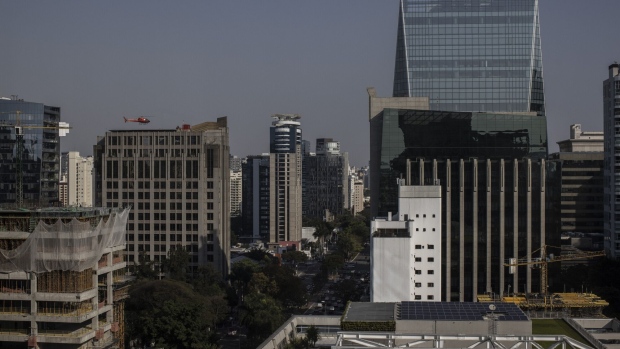Oct 26, 2023
No Beach and Sun as G-20 Finance Chiefs Snub Rio for Sao Paulo
, Bloomberg News

(Bloomberg) -- Rio de Janeiro may have one of the world’s most famous stretches of beach, but that was not enough to tempt Group of 20 finance chiefs to pick Brazil’s top tourist destination for their annual gathering in 2024.
Worried about the overcrowding effects of Carnival in Rio, G-20 finance ministers and central bankers will instead meet in the concrete jungle of Sao Paulo next February, according to Brazilian government officials familiar with the plans.
While Rio de Janeiro was initially considered to host the gathering, the final choice was made by Brazil’s finance ministry, which also took into account Sao Paulo’s access to the banking community, the officials added, requesting anonymity because the plans aren’t public yet.
Rio will still dominate the G-20 calendar next year, the officials said: Mayor Eduardo Paes is helping the foreign affairs ministry coordinate events, including a November presidential summit that is likely to take place at the Museum of Modern Art, a classic symbol of modernist architecture constructed in the 1950s near the Guanabara Bay.
Financial Hub
South America’s financial hub, on the other hand, is a natural locale for the world’s economic powerplayers. Sao Paulo is home to the region’s largest stock exchange, a bevy of major banks and multinational corporations, and Faria Lima — Brazil’s version of Wall Street. Finance Minister Fernando Haddad served as the city’s mayor from 2013 to 2017.
The choice also gives President Luiz Inacio Lula da Silva’s government, which assumed the rotating G-20 presidency from India in September, a chance to showcase the nation’s largest city, one that despite its economic might is often overshadowed by its more scenic neighbor.
Finance chiefs will gather at Sao Paulo’s Biennial Foundation Pavilion, a venue designed by celebrated architect Oscar Niemeyer in the sprawling urban Ibirapuera Park, one of the officials said. The plan is to spread Brazilian artwork throughout the galleries as the meetings take place.
Sao Paulo is notorious for commutes so frustrating they have inspired the launch of helicopter-based ride-hailing services. But the city actually offered logistical relief to the financial summit’s organizers, according to the official.
Millions of tourists flock to Rio every February for the Carnival holiday, which officially lasts just four days but draws visitors and sparks celebrations for the entire month. G-20 foreign ministers will meet there on Feb. 21 and 22, just a week after Carnival’s formal end. But the ongoing parties would make it more difficult for the larger delegations of finance ministers and central bankers to find hotels and move about the city, the official said.
Mayor Paes’ office declined to comment on the decision.
Lula’s administration also wants to spread other events across the country, mirroring the strategy of Indian Prime Minister Narendra Modi, who held 200 meetings and placed at least one in each of his nation’s states and federally-administered territories.
Brazil is planning to hold roughly 100 events, the people familiar said. It will formally kick off its G-20 presidency at a meeting in Brasilia, the capital, on Dec. 1. The government is contemplating a climate change-focused meeting in one of Brazil’s Amazonian states, according to two people from the foreign affairs ministry who are organizing the events.
That would offer a preview of the United Nations’ COP30 climate summit, which will take place in the rainforest city of Belem in 2025.
Read More: Brazil’s Amazon Region to Host UN Climate Summit in 2025
--With assistance from Andrew Rosati.
©2023 Bloomberg L.P.